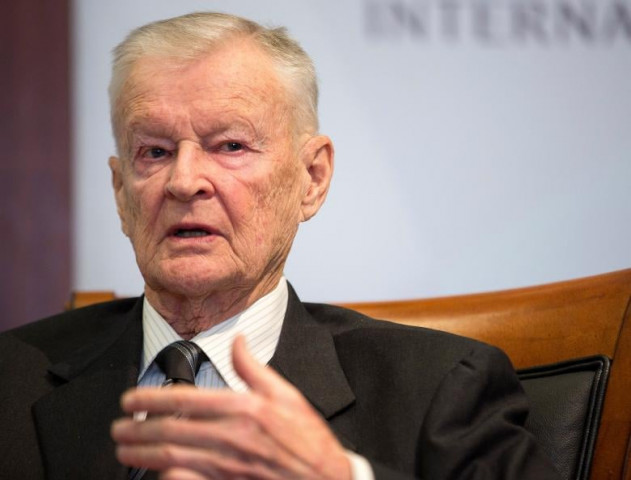Farewell Brzezinski
Zbigniew Brzezinski worked for his country but in many ways what he did then now haunts the US today

Former US National Security Advisor, Zbigniew Brzezinski, speaks at a forum hosted by the Center for Strategic and International Studies in Washington. PHOTO: REUTERS
His death was announced by his daughter, MSNBC host Mika Brzezinski, on social media. “He was known to his friends as Zbig, to his grandchildren as Chief, and to his wife as the enduring love of her life,” she wrote. “I just knew him as the most inspiring, loving, and devoted father any girl could ever have.” These are warm sentiments from a loving daughter but do not do justice to a man who played a vital role in dismembering the Soviet Union and bringing the Russian army to its knees in Afghanistan.
Brezezinski was possibly one of the most outstanding persons who worked with Jimmy Carter. Carter was giant in his own right and served one of the most difficult periods of US foreign policy in a time of the Iran Revolution which culminated in the hostage crisis, the siege of the holy mosque in Makkah and the subsequent anti-American sentiments that ran through the Muslim world - including the burning of the US Embassy in Islamabad, and of course the Soviet intervention in Afghanistan.
The son of a Polish diplomat whose background was in academia. American media described Brzezinski as a hard-line Cold War hawk — he implicitly encouraged, for example, Chinese support of the totalitarian Pol Pot regime to limit Soviet influence in Vietnam — in his later years, Brzezinski opposed the US invasion of Iraq in 2003.
But there are many things about Brzezinski that we do not know much. Former director of the CIA, Robert Gates, stated in his memoirs [“From the Shadows”], that American intelligence services began to aid the Mujahideen in Afghanistan six months before the Soviet intervention. In an interview, Brzezinski affirmed this. He told his interviewer that according to the official version of history, CIA aid to the Mujahideen began during 1980, that is to say, after the Soviet army invaded Afghanistan, 24th December 1979.
But the reality is that it was July 3, 1979 that President Carter signed the first directive for secret aid to the opponents of the pro-Soviet regime in Kabul. And that very day, Brzezinski says he wrote a note to the president in which he explained that in his opinion “this aid was going to induce a Soviet military intervention.”
When pressed, Brzezinski commented “It isn’t quite that. We didn’t push the Russians to intervene, but we knowingly increased the probability that they would.”
This was later referred to as the Bear Trap. The Soviets were induced into intervening in Afghanistan and the world thought that it was their own initiative. Details of this intervention are carefully catalogued in the book by Brigadier Muhammad Yousaf in his book The Bear Tap.
Apart from inviting the Russians into Afghanistan, the other “contribution” he made was help form the Mujahideen. When asked whether he regretted any of what he did, Brzezinski replied: “Regret what? That secret operation was an excellent idea. It had the effect of drawing the Russians into the Afghan trap and you want me to regret it? The day that the Soviets officially crossed the border, I wrote to President Carter: ‘We now have the opportunity of giving to the USSR its Vietnam war.’ Indeed, for almost 10 years, Moscow had to carry on a war unsupportable by the government, a conflict that brought about the demoralisation and finally the breakup of the Soviet empire.”
When asked whether he regretted having given arms and advice to future terrorists, he replied “What is most important to the history of the world? The Taliban or the collapse of the Soviet empire?” Nearly thirty years later, we can only wonder. Brzezinski worked for his country but in many ways what he did then now haunts the US today. Brzezinski should not be forgotten. His role in taking our country where it is today should always be remembered. We continue to distort history and forget important players. This man was an important milestone.
Published in The Express Tribune, May 29th, 2017.
Like Opinion & Editorial on Facebook, follow @ETOpEd on Twitter to receive all updates on all our daily pieces.














COMMENTS
Comments are moderated and generally will be posted if they are on-topic and not abusive.
For more information, please see our Comments FAQ